Nestle's Global Operation Management Strategy: A Detailed Analysis
VerifiedAdded on 2023/04/26
|7
|2016
|288
Report
AI Summary
This report provides a comprehensive analysis of Nestle's international operation management strategy. It begins with an introduction to Nestle, a Swiss multinational company, and its global operations. The report delves into Nestle's strategies, including its focus on health, wellness, and nutrition, driven by innovation and research and development. It examines the company's product and service design, emphasizing the use of common packaging and lean theory to eliminate waste. The report further discusses Nestle's location strategy, quality management, and supply chain, highlighting the importance of innovation and customer engagement. It then evaluates the extent to which these strategies contribute to Nestle's success, acknowledging the need for adaptability due to changing customer needs and government regulations. The report concludes by summarizing the key operational pillars of Nestle, such as operational efficiency, innovation, and customer engagement, emphasizing the importance of adapting to market changes.
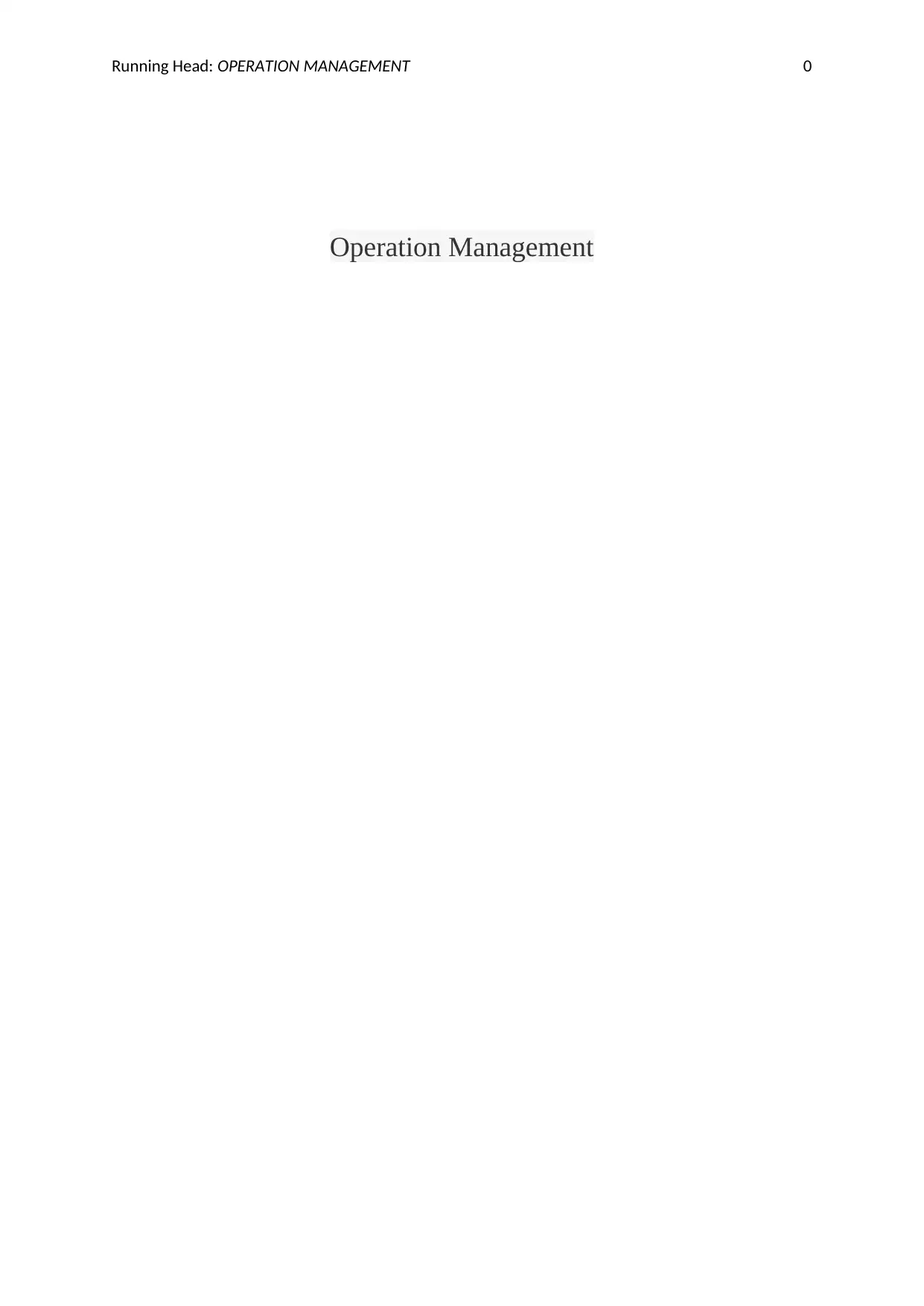
Running Head: OPERATION MANAGEMENT 0
Operation Management
Operation Management
Paraphrase This Document
Need a fresh take? Get an instant paraphrase of this document with our AI Paraphraser
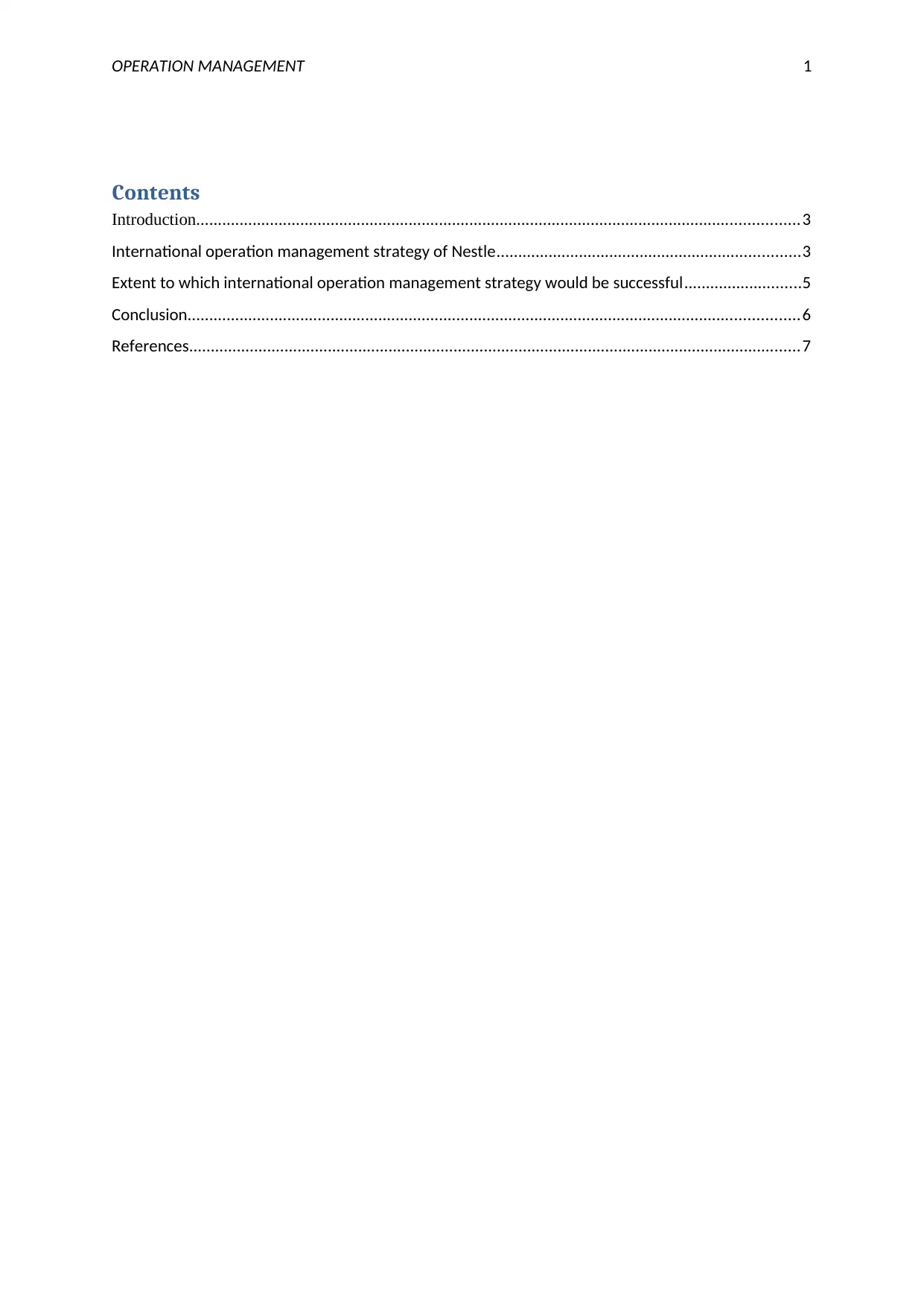
OPERATION MANAGEMENT 1
Contents
Introduction...........................................................................................................................................3
International operation management strategy of Nestle......................................................................3
Extent to which international operation management strategy would be successful...........................5
Conclusion.............................................................................................................................................6
References.............................................................................................................................................7
Contents
Introduction...........................................................................................................................................3
International operation management strategy of Nestle......................................................................3
Extent to which international operation management strategy would be successful...........................5
Conclusion.............................................................................................................................................6
References.............................................................................................................................................7
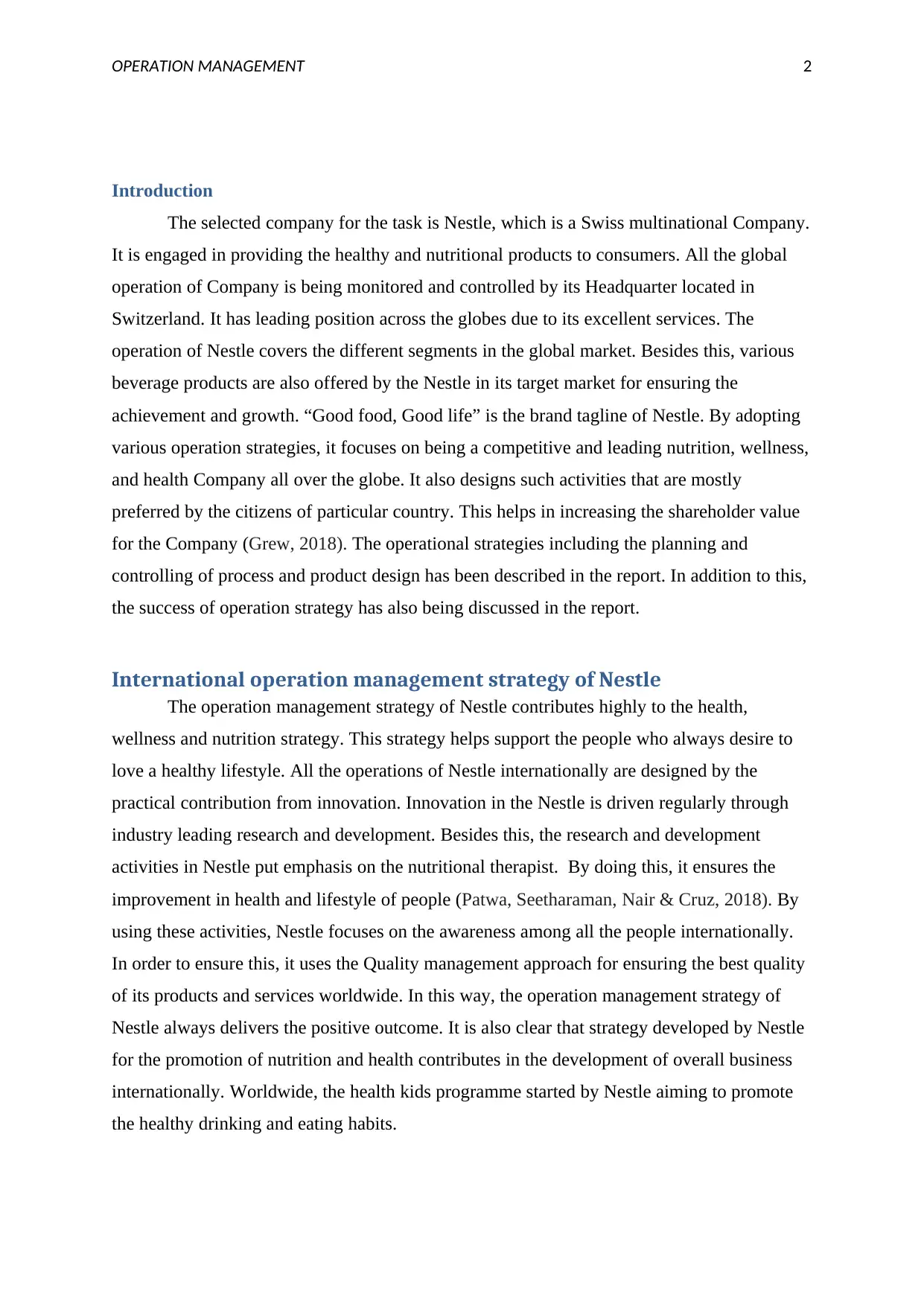
OPERATION MANAGEMENT 2
Introduction
The selected company for the task is Nestle, which is a Swiss multinational Company.
It is engaged in providing the healthy and nutritional products to consumers. All the global
operation of Company is being monitored and controlled by its Headquarter located in
Switzerland. It has leading position across the globes due to its excellent services. The
operation of Nestle covers the different segments in the global market. Besides this, various
beverage products are also offered by the Nestle in its target market for ensuring the
achievement and growth. “Good food, Good life” is the brand tagline of Nestle. By adopting
various operation strategies, it focuses on being a competitive and leading nutrition, wellness,
and health Company all over the globe. It also designs such activities that are mostly
preferred by the citizens of particular country. This helps in increasing the shareholder value
for the Company (Grew, 2018). The operational strategies including the planning and
controlling of process and product design has been described in the report. In addition to this,
the success of operation strategy has also being discussed in the report.
International operation management strategy of Nestle
The operation management strategy of Nestle contributes highly to the health,
wellness and nutrition strategy. This strategy helps support the people who always desire to
love a healthy lifestyle. All the operations of Nestle internationally are designed by the
practical contribution from innovation. Innovation in the Nestle is driven regularly through
industry leading research and development. Besides this, the research and development
activities in Nestle put emphasis on the nutritional therapist. By doing this, it ensures the
improvement in health and lifestyle of people (Patwa, Seetharaman, Nair & Cruz, 2018). By
using these activities, Nestle focuses on the awareness among all the people internationally.
In order to ensure this, it uses the Quality management approach for ensuring the best quality
of its products and services worldwide. In this way, the operation management strategy of
Nestle always delivers the positive outcome. It is also clear that strategy developed by Nestle
for the promotion of nutrition and health contributes in the development of overall business
internationally. Worldwide, the health kids programme started by Nestle aiming to promote
the healthy drinking and eating habits.
Introduction
The selected company for the task is Nestle, which is a Swiss multinational Company.
It is engaged in providing the healthy and nutritional products to consumers. All the global
operation of Company is being monitored and controlled by its Headquarter located in
Switzerland. It has leading position across the globes due to its excellent services. The
operation of Nestle covers the different segments in the global market. Besides this, various
beverage products are also offered by the Nestle in its target market for ensuring the
achievement and growth. “Good food, Good life” is the brand tagline of Nestle. By adopting
various operation strategies, it focuses on being a competitive and leading nutrition, wellness,
and health Company all over the globe. It also designs such activities that are mostly
preferred by the citizens of particular country. This helps in increasing the shareholder value
for the Company (Grew, 2018). The operational strategies including the planning and
controlling of process and product design has been described in the report. In addition to this,
the success of operation strategy has also being discussed in the report.
International operation management strategy of Nestle
The operation management strategy of Nestle contributes highly to the health,
wellness and nutrition strategy. This strategy helps support the people who always desire to
love a healthy lifestyle. All the operations of Nestle internationally are designed by the
practical contribution from innovation. Innovation in the Nestle is driven regularly through
industry leading research and development. Besides this, the research and development
activities in Nestle put emphasis on the nutritional therapist. By doing this, it ensures the
improvement in health and lifestyle of people (Patwa, Seetharaman, Nair & Cruz, 2018). By
using these activities, Nestle focuses on the awareness among all the people internationally.
In order to ensure this, it uses the Quality management approach for ensuring the best quality
of its products and services worldwide. In this way, the operation management strategy of
Nestle always delivers the positive outcome. It is also clear that strategy developed by Nestle
for the promotion of nutrition and health contributes in the development of overall business
internationally. Worldwide, the health kids programme started by Nestle aiming to promote
the healthy drinking and eating habits.
⊘ This is a preview!⊘
Do you want full access?
Subscribe today to unlock all pages.

Trusted by 1+ million students worldwide
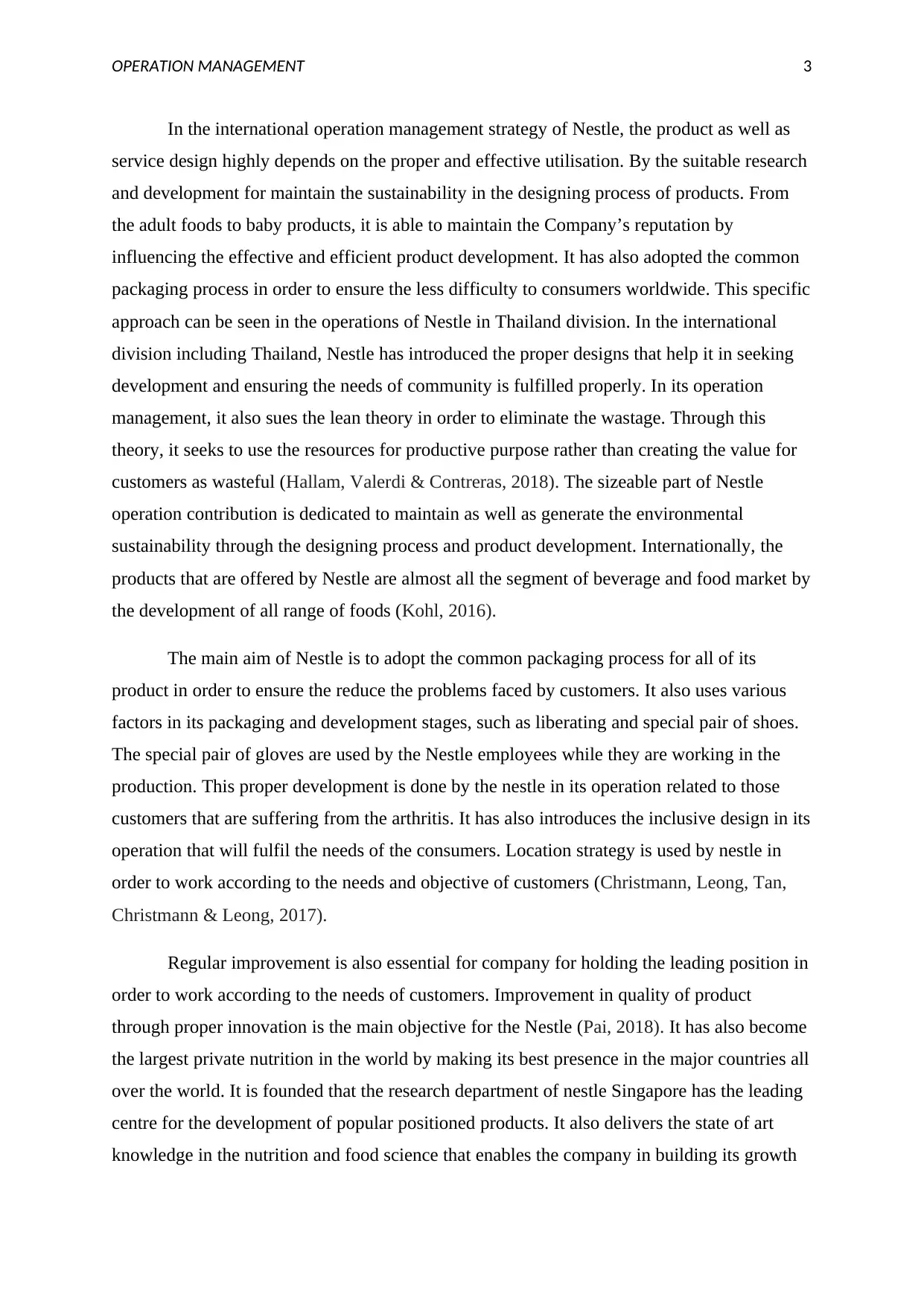
OPERATION MANAGEMENT 3
In the international operation management strategy of Nestle, the product as well as
service design highly depends on the proper and effective utilisation. By the suitable research
and development for maintain the sustainability in the designing process of products. From
the adult foods to baby products, it is able to maintain the Company’s reputation by
influencing the effective and efficient product development. It has also adopted the common
packaging process in order to ensure the less difficulty to consumers worldwide. This specific
approach can be seen in the operations of Nestle in Thailand division. In the international
division including Thailand, Nestle has introduced the proper designs that help it in seeking
development and ensuring the needs of community is fulfilled properly. In its operation
management, it also sues the lean theory in order to eliminate the wastage. Through this
theory, it seeks to use the resources for productive purpose rather than creating the value for
customers as wasteful (Hallam, Valerdi & Contreras, 2018). The sizeable part of Nestle
operation contribution is dedicated to maintain as well as generate the environmental
sustainability through the designing process and product development. Internationally, the
products that are offered by Nestle are almost all the segment of beverage and food market by
the development of all range of foods (Kohl, 2016).
The main aim of Nestle is to adopt the common packaging process for all of its
product in order to ensure the reduce the problems faced by customers. It also uses various
factors in its packaging and development stages, such as liberating and special pair of shoes.
The special pair of gloves are used by the Nestle employees while they are working in the
production. This proper development is done by the nestle in its operation related to those
customers that are suffering from the arthritis. It has also introduces the inclusive design in its
operation that will fulfil the needs of the consumers. Location strategy is used by nestle in
order to work according to the needs and objective of customers (Christmann, Leong, Tan,
Christmann & Leong, 2017).
Regular improvement is also essential for company for holding the leading position in
order to work according to the needs of customers. Improvement in quality of product
through proper innovation is the main objective for the Nestle (Pai, 2018). It has also become
the largest private nutrition in the world by making its best presence in the major countries all
over the world. It is founded that the research department of nestle Singapore has the leading
centre for the development of popular positioned products. It also delivers the state of art
knowledge in the nutrition and food science that enables the company in building its growth
In the international operation management strategy of Nestle, the product as well as
service design highly depends on the proper and effective utilisation. By the suitable research
and development for maintain the sustainability in the designing process of products. From
the adult foods to baby products, it is able to maintain the Company’s reputation by
influencing the effective and efficient product development. It has also adopted the common
packaging process in order to ensure the less difficulty to consumers worldwide. This specific
approach can be seen in the operations of Nestle in Thailand division. In the international
division including Thailand, Nestle has introduced the proper designs that help it in seeking
development and ensuring the needs of community is fulfilled properly. In its operation
management, it also sues the lean theory in order to eliminate the wastage. Through this
theory, it seeks to use the resources for productive purpose rather than creating the value for
customers as wasteful (Hallam, Valerdi & Contreras, 2018). The sizeable part of Nestle
operation contribution is dedicated to maintain as well as generate the environmental
sustainability through the designing process and product development. Internationally, the
products that are offered by Nestle are almost all the segment of beverage and food market by
the development of all range of foods (Kohl, 2016).
The main aim of Nestle is to adopt the common packaging process for all of its
product in order to ensure the reduce the problems faced by customers. It also uses various
factors in its packaging and development stages, such as liberating and special pair of shoes.
The special pair of gloves are used by the Nestle employees while they are working in the
production. This proper development is done by the nestle in its operation related to those
customers that are suffering from the arthritis. It has also introduces the inclusive design in its
operation that will fulfil the needs of the consumers. Location strategy is used by nestle in
order to work according to the needs and objective of customers (Christmann, Leong, Tan,
Christmann & Leong, 2017).
Regular improvement is also essential for company for holding the leading position in
order to work according to the needs of customers. Improvement in quality of product
through proper innovation is the main objective for the Nestle (Pai, 2018). It has also become
the largest private nutrition in the world by making its best presence in the major countries all
over the world. It is founded that the research department of nestle Singapore has the leading
centre for the development of popular positioned products. It also delivers the state of art
knowledge in the nutrition and food science that enables the company in building its growth
Paraphrase This Document
Need a fresh take? Get an instant paraphrase of this document with our AI Paraphraser
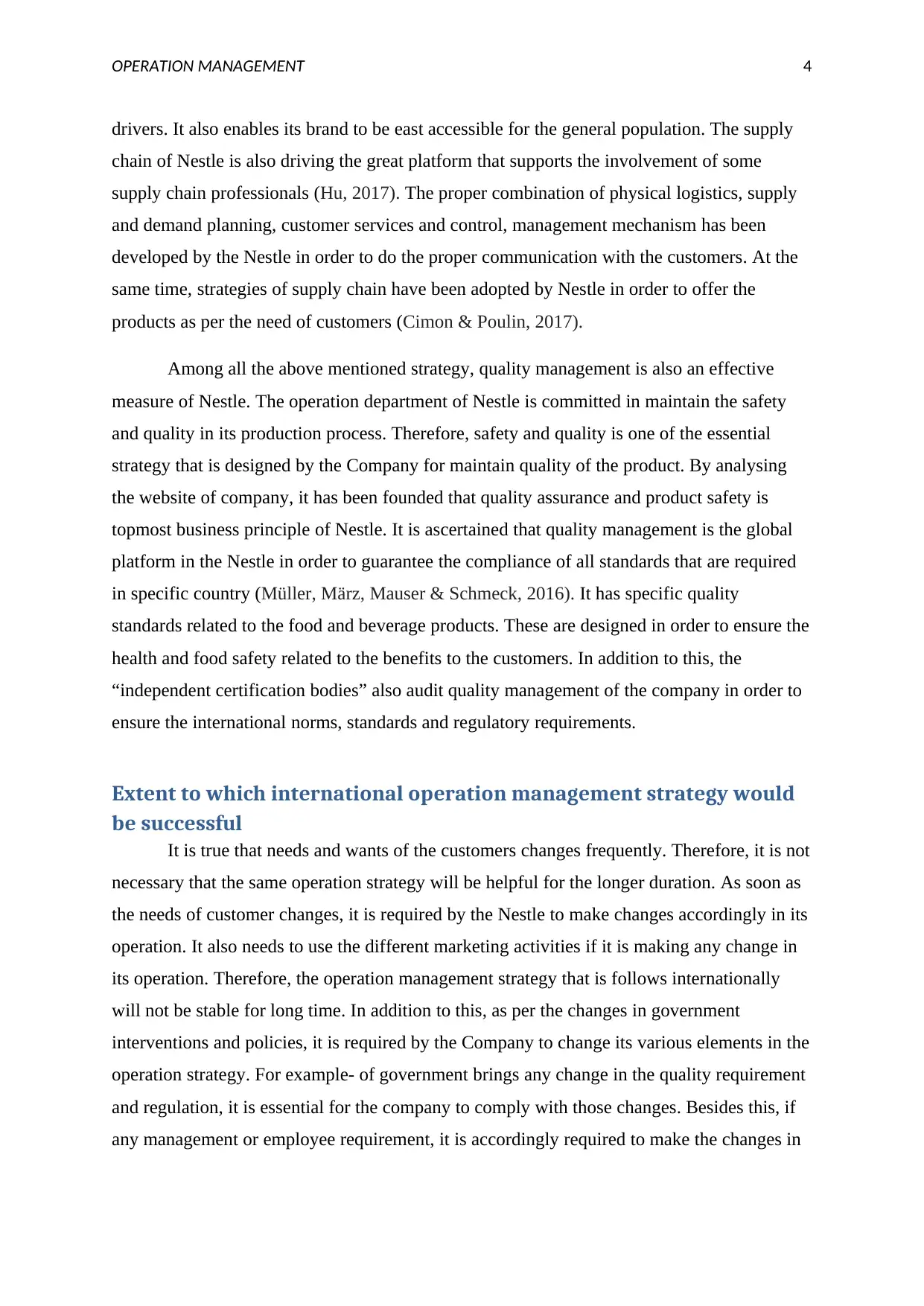
OPERATION MANAGEMENT 4
drivers. It also enables its brand to be east accessible for the general population. The supply
chain of Nestle is also driving the great platform that supports the involvement of some
supply chain professionals (Hu, 2017). The proper combination of physical logistics, supply
and demand planning, customer services and control, management mechanism has been
developed by the Nestle in order to do the proper communication with the customers. At the
same time, strategies of supply chain have been adopted by Nestle in order to offer the
products as per the need of customers (Cimon & Poulin, 2017).
Among all the above mentioned strategy, quality management is also an effective
measure of Nestle. The operation department of Nestle is committed in maintain the safety
and quality in its production process. Therefore, safety and quality is one of the essential
strategy that is designed by the Company for maintain quality of the product. By analysing
the website of company, it has been founded that quality assurance and product safety is
topmost business principle of Nestle. It is ascertained that quality management is the global
platform in the Nestle in order to guarantee the compliance of all standards that are required
in specific country (Müller, März, Mauser & Schmeck, 2016). It has specific quality
standards related to the food and beverage products. These are designed in order to ensure the
health and food safety related to the benefits to the customers. In addition to this, the
“independent certification bodies” also audit quality management of the company in order to
ensure the international norms, standards and regulatory requirements.
Extent to which international operation management strategy would
be successful
It is true that needs and wants of the customers changes frequently. Therefore, it is not
necessary that the same operation strategy will be helpful for the longer duration. As soon as
the needs of customer changes, it is required by the Nestle to make changes accordingly in its
operation. It also needs to use the different marketing activities if it is making any change in
its operation. Therefore, the operation management strategy that is follows internationally
will not be stable for long time. In addition to this, as per the changes in government
interventions and policies, it is required by the Company to change its various elements in the
operation strategy. For example- of government brings any change in the quality requirement
and regulation, it is essential for the company to comply with those changes. Besides this, if
any management or employee requirement, it is accordingly required to make the changes in
drivers. It also enables its brand to be east accessible for the general population. The supply
chain of Nestle is also driving the great platform that supports the involvement of some
supply chain professionals (Hu, 2017). The proper combination of physical logistics, supply
and demand planning, customer services and control, management mechanism has been
developed by the Nestle in order to do the proper communication with the customers. At the
same time, strategies of supply chain have been adopted by Nestle in order to offer the
products as per the need of customers (Cimon & Poulin, 2017).
Among all the above mentioned strategy, quality management is also an effective
measure of Nestle. The operation department of Nestle is committed in maintain the safety
and quality in its production process. Therefore, safety and quality is one of the essential
strategy that is designed by the Company for maintain quality of the product. By analysing
the website of company, it has been founded that quality assurance and product safety is
topmost business principle of Nestle. It is ascertained that quality management is the global
platform in the Nestle in order to guarantee the compliance of all standards that are required
in specific country (Müller, März, Mauser & Schmeck, 2016). It has specific quality
standards related to the food and beverage products. These are designed in order to ensure the
health and food safety related to the benefits to the customers. In addition to this, the
“independent certification bodies” also audit quality management of the company in order to
ensure the international norms, standards and regulatory requirements.
Extent to which international operation management strategy would
be successful
It is true that needs and wants of the customers changes frequently. Therefore, it is not
necessary that the same operation strategy will be helpful for the longer duration. As soon as
the needs of customer changes, it is required by the Nestle to make changes accordingly in its
operation. It also needs to use the different marketing activities if it is making any change in
its operation. Therefore, the operation management strategy that is follows internationally
will not be stable for long time. In addition to this, as per the changes in government
interventions and policies, it is required by the Company to change its various elements in the
operation strategy. For example- of government brings any change in the quality requirement
and regulation, it is essential for the company to comply with those changes. Besides this, if
any management or employee requirement, it is accordingly required to make the changes in
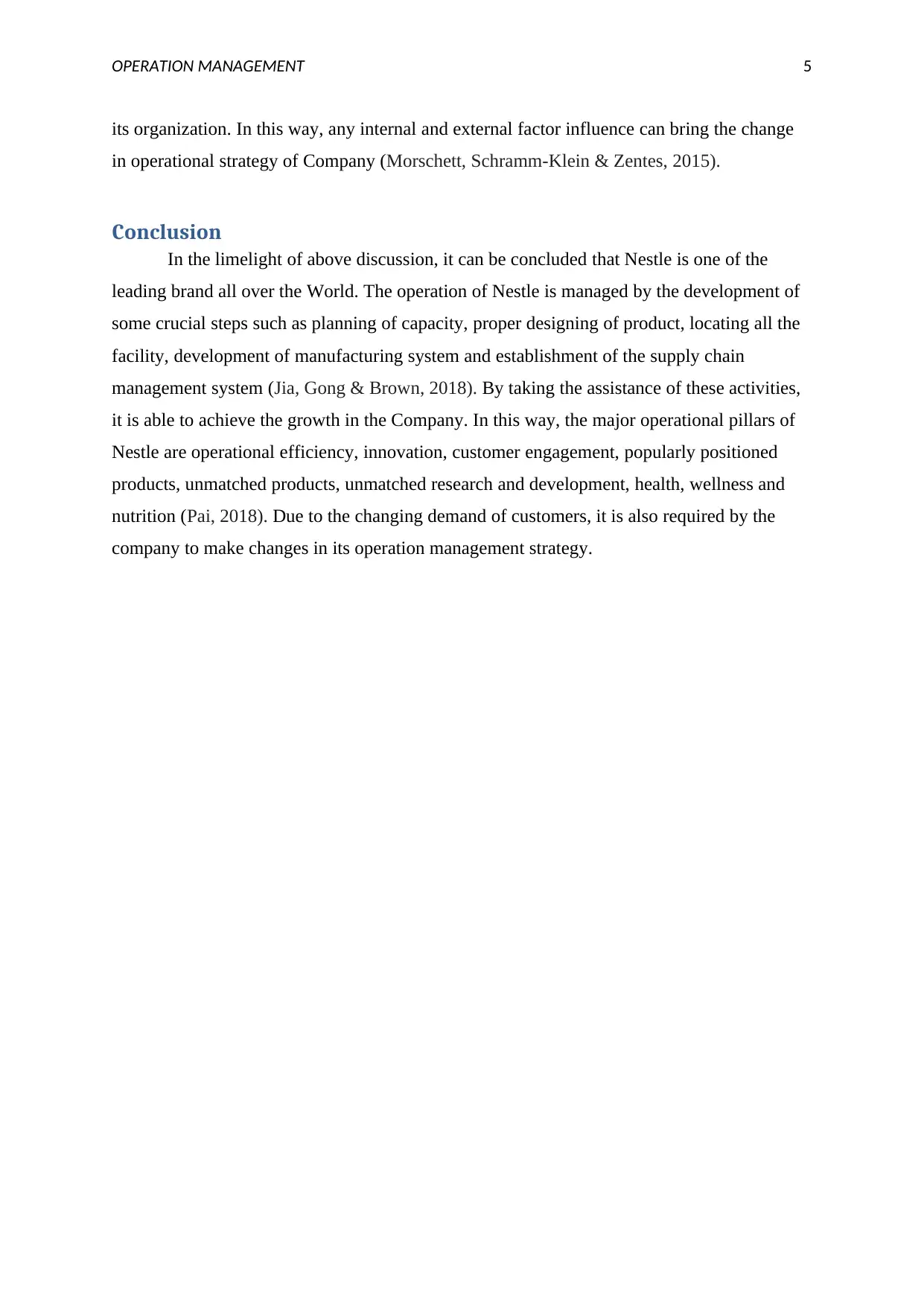
OPERATION MANAGEMENT 5
its organization. In this way, any internal and external factor influence can bring the change
in operational strategy of Company (Morschett, Schramm-Klein & Zentes, 2015).
Conclusion
In the limelight of above discussion, it can be concluded that Nestle is one of the
leading brand all over the World. The operation of Nestle is managed by the development of
some crucial steps such as planning of capacity, proper designing of product, locating all the
facility, development of manufacturing system and establishment of the supply chain
management system (Jia, Gong & Brown, 2018). By taking the assistance of these activities,
it is able to achieve the growth in the Company. In this way, the major operational pillars of
Nestle are operational efficiency, innovation, customer engagement, popularly positioned
products, unmatched products, unmatched research and development, health, wellness and
nutrition (Pai, 2018). Due to the changing demand of customers, it is also required by the
company to make changes in its operation management strategy.
its organization. In this way, any internal and external factor influence can bring the change
in operational strategy of Company (Morschett, Schramm-Klein & Zentes, 2015).
Conclusion
In the limelight of above discussion, it can be concluded that Nestle is one of the
leading brand all over the World. The operation of Nestle is managed by the development of
some crucial steps such as planning of capacity, proper designing of product, locating all the
facility, development of manufacturing system and establishment of the supply chain
management system (Jia, Gong & Brown, 2018). By taking the assistance of these activities,
it is able to achieve the growth in the Company. In this way, the major operational pillars of
Nestle are operational efficiency, innovation, customer engagement, popularly positioned
products, unmatched products, unmatched research and development, health, wellness and
nutrition (Pai, 2018). Due to the changing demand of customers, it is also required by the
company to make changes in its operation management strategy.
⊘ This is a preview!⊘
Do you want full access?
Subscribe today to unlock all pages.

Trusted by 1+ million students worldwide
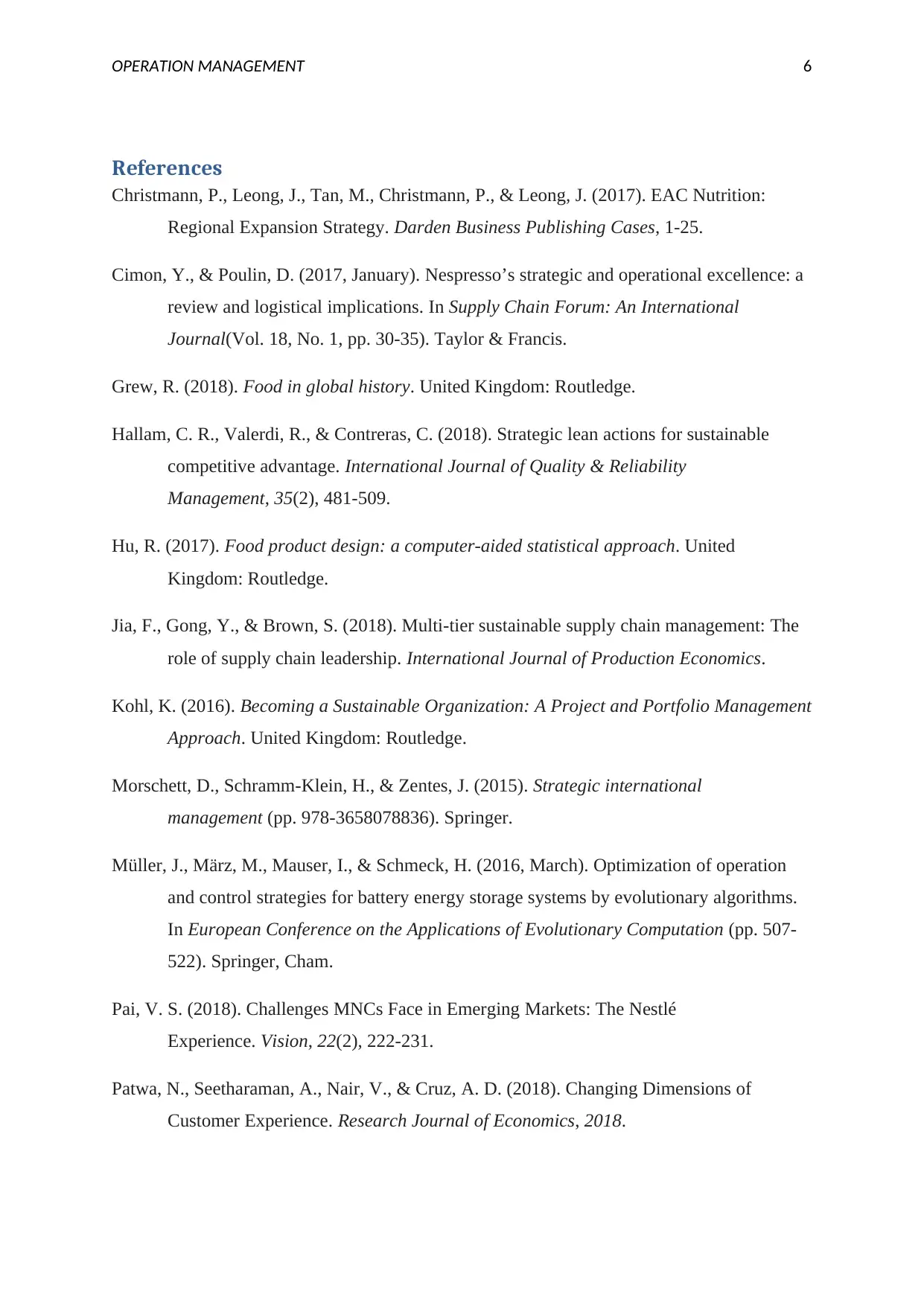
OPERATION MANAGEMENT 6
References
Christmann, P., Leong, J., Tan, M., Christmann, P., & Leong, J. (2017). EAC Nutrition:
Regional Expansion Strategy. Darden Business Publishing Cases, 1-25.
Cimon, Y., & Poulin, D. (2017, January). Nespresso’s strategic and operational excellence: a
review and logistical implications. In Supply Chain Forum: An International
Journal(Vol. 18, No. 1, pp. 30-35). Taylor & Francis.
Grew, R. (2018). Food in global history. United Kingdom: Routledge.
Hallam, C. R., Valerdi, R., & Contreras, C. (2018). Strategic lean actions for sustainable
competitive advantage. International Journal of Quality & Reliability
Management, 35(2), 481-509.
Hu, R. (2017). Food product design: a computer-aided statistical approach. United
Kingdom: Routledge.
Jia, F., Gong, Y., & Brown, S. (2018). Multi-tier sustainable supply chain management: The
role of supply chain leadership. International Journal of Production Economics.
Kohl, K. (2016). Becoming a Sustainable Organization: A Project and Portfolio Management
Approach. United Kingdom: Routledge.
Morschett, D., Schramm-Klein, H., & Zentes, J. (2015). Strategic international
management (pp. 978-3658078836). Springer.
Müller, J., März, M., Mauser, I., & Schmeck, H. (2016, March). Optimization of operation
and control strategies for battery energy storage systems by evolutionary algorithms.
In European Conference on the Applications of Evolutionary Computation (pp. 507-
522). Springer, Cham.
Pai, V. S. (2018). Challenges MNCs Face in Emerging Markets: The Nestlé
Experience. Vision, 22(2), 222-231.
Patwa, N., Seetharaman, A., Nair, V., & Cruz, A. D. (2018). Changing Dimensions of
Customer Experience. Research Journal of Economics, 2018.
References
Christmann, P., Leong, J., Tan, M., Christmann, P., & Leong, J. (2017). EAC Nutrition:
Regional Expansion Strategy. Darden Business Publishing Cases, 1-25.
Cimon, Y., & Poulin, D. (2017, January). Nespresso’s strategic and operational excellence: a
review and logistical implications. In Supply Chain Forum: An International
Journal(Vol. 18, No. 1, pp. 30-35). Taylor & Francis.
Grew, R. (2018). Food in global history. United Kingdom: Routledge.
Hallam, C. R., Valerdi, R., & Contreras, C. (2018). Strategic lean actions for sustainable
competitive advantage. International Journal of Quality & Reliability
Management, 35(2), 481-509.
Hu, R. (2017). Food product design: a computer-aided statistical approach. United
Kingdom: Routledge.
Jia, F., Gong, Y., & Brown, S. (2018). Multi-tier sustainable supply chain management: The
role of supply chain leadership. International Journal of Production Economics.
Kohl, K. (2016). Becoming a Sustainable Organization: A Project and Portfolio Management
Approach. United Kingdom: Routledge.
Morschett, D., Schramm-Klein, H., & Zentes, J. (2015). Strategic international
management (pp. 978-3658078836). Springer.
Müller, J., März, M., Mauser, I., & Schmeck, H. (2016, March). Optimization of operation
and control strategies for battery energy storage systems by evolutionary algorithms.
In European Conference on the Applications of Evolutionary Computation (pp. 507-
522). Springer, Cham.
Pai, V. S. (2018). Challenges MNCs Face in Emerging Markets: The Nestlé
Experience. Vision, 22(2), 222-231.
Patwa, N., Seetharaman, A., Nair, V., & Cruz, A. D. (2018). Changing Dimensions of
Customer Experience. Research Journal of Economics, 2018.
1 out of 7
Related Documents
Your All-in-One AI-Powered Toolkit for Academic Success.
+13062052269
info@desklib.com
Available 24*7 on WhatsApp / Email
![[object Object]](/_next/static/media/star-bottom.7253800d.svg)
Unlock your academic potential
Copyright © 2020–2026 A2Z Services. All Rights Reserved. Developed and managed by ZUCOL.





